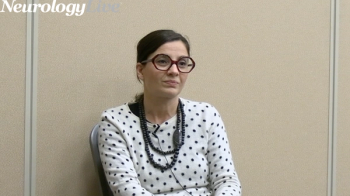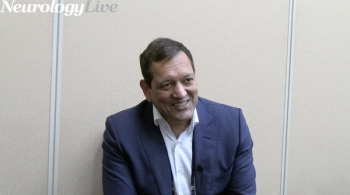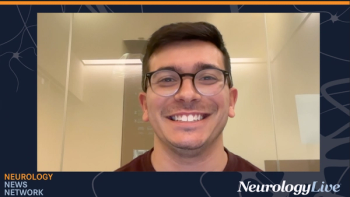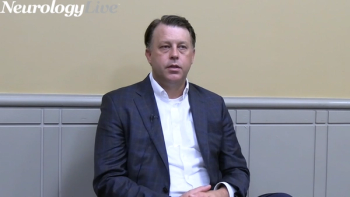
In the MOXIe open-label extension study presented at MDS 2025, omaveloxolone treatment was associated with no significant disease progression in bulbar function or upper limb coordination.

In the MOXIe open-label extension study presented at MDS 2025, omaveloxolone treatment was associated with no significant disease progression in bulbar function or upper limb coordination.

The chief of the Movement Disorders Division at Yale School of Medicine discusses the nuance around patient choice in Huntington disease testing and providing treatment regardless of confirmation. [WATCH TIME: 3 minutes]

The chief medical officer of Gain Therapeutics discusses the challenges that are unaddressed with currently available treatments for Parkinson, and how investigational treatments like GT-02287 might address those needs. [WATCH TIME: 3 minutes]

The neurologist at University of British Columbia discussed how breakdowns in brain organization and compensatory mechanisms may influence progression in Parkinson disease. [WATCH TIME: 5 minutes]

Valbenazine shows significant improvements in physical, social, and emotional outcomes for tardive dyskinesia patients, as revealed in a recent study.

The chief medical officer of Gain Therapeutics discusses GT-02287, a promising treatment for Parkinson that has shown strong safety and tolerability in an ongoing phase 1 trial. [WATCH TIME: 3 minutes]

New real-world data confirms the safety and tolerability of high-dose apomorphine infusion for advanced Parkinson's disease, enhancing treatment options.

A phase 2 study shows risvodetinib improves safety and symptoms in early Parkinson disease, suggesting potential as a disease-modifying therapy.

New research highlights ecopipam's effectiveness in reducing Tourette syndrome symptoms and relapse risk in children, offering a promising treatment alternative.

The trial, a 20-week study assessing lamotrigine in DLB, will use change in Clinical Dementia Rating-Sum of Boxes as the primary efficacy end point, with several other notable secondary outcomes.

The consultant neurologist and senior lecturer at St. Georges Hospital in London, explores the origins of common neuropsychiatric symptoms experienced by patients with Parkinson disease and how they may be exasperated. [WATCH TIME: 4 minutes]

David Devos, MD, PhD, a neuropharmacologist at the University of Lille, in France, discussed positive data from an early-stage study assessing InBrain Pharma’s device-assisted therapy in Parkinson disease.

Mind Moments®, a podcast from NeurologyLive®, brings you an exclusive interview with Daniel Claassen, MD, MS. [LISTEN TIME: 14 minutes]

Jonas Hannestad, MD, PhD, chief medical officer at Gain Therapeutics, provided clinical perspective on promising data from a phase 1 first-in-human study of GT-02287, an investigational therapy for Parkinson disease with or without a GBA1 mutation.

The chief medical officer and chief development officer at BlueRock Therapeutics discussed the promise behind bemdaneprocel and its unique mechanism of action relative to other Parkinson disease treatments. [WATCH TIME: 3 minutes]

Neurology News Network. for the week ending October 5, 2024. [WATCH TIME: 4 minutes]

Over a 12-month period, patients showed sustained improvements in disease progression through valbenazine, regardless of concomitant antipsychotic treatment.

This trial aims to explore the role of the noradrenergic system in behavioral and cognitive outcomes and could lead to new therapeutic strategies for managing PSP.

ION464 is designed to inhibit the production of the alpha-synuclein protein, aiming to reduce the accumulation of this protein in the brain, which is believed to be a key factor driving neurodegeneration in MSA and Parkinson disease.

The director of the Huntington’s Disease Clinic at Vanderbilt University Medical Center gave commentary on the unique development of ATH434, its ability to target iron accumulation, and how it may slow disease progression in multiple system atrophy. [WATCH TIME: 3 minutes]

The consultant neurologist and senior lecturer at St. Georges Hospital in London, provided commentary on the diagnosis, management, and future research around neuropsychiatric symptoms of Parkinson disease.

A recent survey showed that patients with Parkinson disease quickly adapted to using continuous subcutaneous apomorphine infusion therapy, with high amount of recommending the device to others.

Amantadine extended-release capsules, approved for levodopa-related dyskinesia and OFF episodes in Parkinson disease, offer high amantadine concentrations that peak in the time of first morning levodopa dose.

The chief medical officer and chief development officer at BlueRock Therapeutics provided perspective on newly presented data investigating a cell therapy for patients with Parkinson disease. [WATCH TIME: 4 minutes]

The president and chief executive officer at Praxis Precision Medicine provided clinical insight on the promising build of ulixacaltamide, an investigational, selective agent in development for essential tremor. [WATCH TIME: 3 minutes]

ELATE, a multicenter, randomized, double-blind, placebo-controlled trial, aims to address the limitations of current oral therapies by exploring a targeted, localized treatment option.

In a post hoc analysis of the COSMOS study, 24-hour LCIG infusion led to a reduction in nocturnal and morning akinesia, though many patients continued to rely on nighttime add-on medications.

The neuropharmacologist at the University of Lille, in France, provided commentary on promising results from the phase 1/2 DIVE-I trial assessing the safety and efficacy of a device-assisted therapy in Parkinson disease. [WATCH TIME: 6 minutes]

While participants responded positively to nutritional guidance and the Mediterranean diet, they expressed negative views on the ketogenic diet due to its restrictive nature, social impracticality, and gastrointestinal side effects of MCT oil.

Patients reported increased good ON time and improved confidence in daily activities while experiencing a lower treatment burden compared to their previous medication regimens.